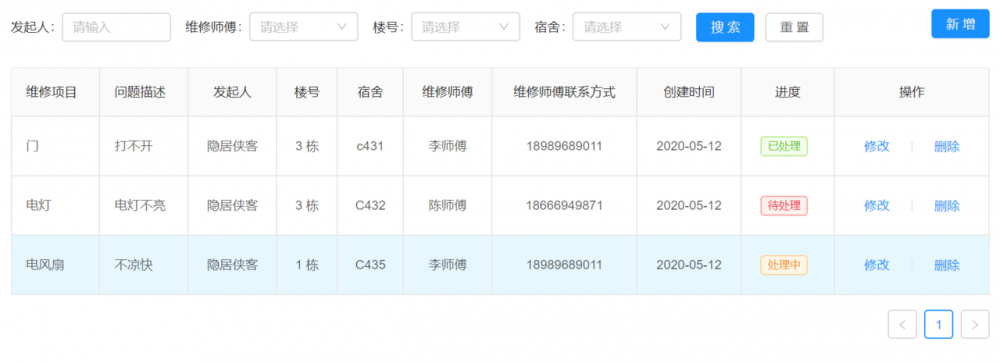如何在 vue 中封装好用不上火的一个列表条件过滤组件
平时工作中,想必你一定会遇到无数次列表需求,并且是带有搜索功能的列表需求,但不管怎么怎么样,请相信这一切都是万变不离其宗。
不信?请看:
- 可输入关键字进行搜索
- 可在下拉框中选择搜索条件
- 可以选择日期时间
- 可以勾选 的复选框
基本就是上面这些了吧?我们不妨看看下面这张截图:

本文所说的组件封装是指业务上的封装,而不是组件底层的封装,像这种底层封装的组件库很多,比如:antd、element。
正常套路
上面的截图也算是简单的了,只有一个两种类型,一个是输入框,一个是下拉框,但也足以说明问题了,回想一下,当你遇到这样的需求你会如何实现?一般地我们是不是会像下面这样写书:
<div class="container">
<a-row>
<a-col :span="20">
<a-form class="search-form" layout="inline" @submit="search">
<a-form-item label="维修项目">
<a-input placeholder="请输入" />
</a-form-item>
<a-form-item label="维修师傅">
<a-select placeholder="请选择">
<a-select-option
:value="item.id"
:key="item.id"
v-for="item of userOptions"
>{{item.name}}</a-select-option>
</a-select>
</a-form-item>
<a-form-item label="楼号">
<a-select placeholder="请选择">
<a-select-option
:value="item.id"
:key="item.id"
v-for="item of floorOptions"
>{{item.name}}</a-select-option>
</a-select>
</a-form-item>
<a-form-item label="宿舍">
<a-select placeholder="请选择">
<a-select-option
:value="item.id"
:key="item.id"
v-for="item of roomOptions"
>{{item.name}}</a-select-option>
</a-select>
</a-form-item>
<a-form-item class="button">
<a-button class="offset-right-12" type="primary" html-type="submit">搜索</a-button>
<a-button @click="reset">重置</a-button>
</a-form-item>
</a-form>
</a-col>
<a-col :span="4" class="text-right">
<a-button type="primary" @click="showModal()">新增</a-button>
</a-col>
</a-row>
<a-table
class="offset-top-12"
rowKey="id"
:pagination="pagination"
:loading="loading"
bordered
:columns="columns"
:dataSource="dataList"
>
<span slot="visitDate" slot-scope="scope">{{scope.visitDate | date}}</span>
<span slot="leaveDate" slot-scope="scope">{{scope.leaveDate | date}}</span>
<span slot="createDate" slot-scope="scope">{{scope.createDate | date}}</span>
<div slot="action" slot-scope="scope" class="text-right no-wrap">
<a-button type="link" @click="showModal(scope)">修改</a-button>
<a-divider type="vertical" />
<a-button type="link" @click="deleteModal(scope.id)">删除</a-button>
</div>
</a-table>
</div>
</template>
复制代码
示例基于 antd vue
如果过滤条件更多(常有的事),那么页面中的代码量更加惊人,整个页面弥漫着反客为主的味道,仅仅是过滤条件就已经占了整个页面的一半。
这会导致什么问题?
- 页面代码量过多
- 代码不好维护
- 无法对多个列表页面中的这些查询条件样式统一的修改(比如:样式)
- 即使不是修改这些查询条件,也会让你在维护时花更多的时间去定位代码
如果觉得页面代码时过多,不会对你在开发以及维护上产生过多的负面影响,但至少有一个理由我觉得你应该选择去把这些过滤条件进行封装,那就是如果不去对列表页过滤条件进行封装,若遇到统一修改这些过滤条件(不管是业务性的,还是样式及结构的)你就会变得很被动,瞬间从高大尚的脑力活变成了出力不讨好的苦力活。那么如何去封装呢?
- 我们可以把过滤条件里的所有可能都放到一个组件中,然后通过一个字段来判断到底要显示哪个
- 自定义键名(对于下拉框等场景需要,并且我们可以为其设置默认的
key,分别为:id,name) - 如何实现过滤条件的数据收集(用于接口请求的参数)
封装
组件有至少有两个参数以及两个事件。其中一个参数是用于遍历出过滤条件的一个数组,另一个是保存了所有查询参数的一个对象。
为什么分成两个参数,而不一个参数搞定。原因如下:
- 如果都放到一个参数里就会让组件思路不够清晰明,虽然说一个参数比两个参数更加方便,但对于开发者而言,需要兼顾效率的同时也要考虑到组件本身的封装及代码实现。
- 对于这个过滤组件来说,显示 UI 的数据及参数分开,可以让使用者更容易理解,这也是封装组件的一个必需要考虑细节之一。
两个事件分别是 search 和 rest ,这两个应该不用多说了。下面我们就先来看看封装好的条件过滤组件。
<template>
<a-row>
<a-col :span="20">
<a-form class="search-form" :form="form" layout="inline" @submit="search">
<a-form-item :label="item.name" v-for="(item, index) of items" :key="index">
<a-input v-model="searchParams[item.key]" v-if="!item.type || item.type === 'input'" :placeholder="item.placeholder || '请输入'"/>
<a-select allowClear v-model="searchParams[item.key]" v-else-if="item.type === 'select'" :placeholder="item.placeholder || '请选择'">
<a-select-option
:key="index"
v-for="(option, index) of item.options"
:value="option[item.optionValuekey || 'id']"
>{{option[item.optionNamekey || 'name']}}</a-select-option>
</a-select>
</a-form-item>
<a-form-item class="button">
<a-button type="primary" html-type="submit">搜索</a-button>
<a-button @click="reset">重置</a-button>
</a-form-item>
</a-form>
</a-col>
<a-col :span="4" class="text-right">
<slot name="right-content"></slot>
</a-col>
</a-row>
</template>
<script>
import deepClone from "@/utils/deepClone";
/**
* items 为过滤条件,可以在对应的项中自定义下拉选项的名称(optionNamekey)和值(optionValuekey)的键,默认分别取 name 和 id
* items 如何要下拉框显示 placeholder,对应的下拉框的初始值可以设置为 undefined 或者 不定义查询参数,如果设置为空, placeholder 不会显示。
* searchParams 为接口查询参数对象
*/
export default {
model: {
prop: 'searchParams',
event: "change"
},
props: {
searchParams: {
type: Object,
default: () => {
return {};
}
},
items: {
type: Array,
default: () => {
return [];
}
}
},
data() {
return {
// 保存初始化时的项
initSearchParams:{},
form: this.$form.createForm(this, { name: "dynamic_search" })
};
},
created() {
this.init()
},
methods: {
init(){
// 保存初始值的
this.initSearchParams = deepClone(this.searchParams)
},
search() {
const cpValue = deepClone(this.searchParams)
this.$emit("change", cpValue);
this.$emit("search", cpValue);
},
reset() {
const cpValue = deepClone(this.initSearchParams)
this.$emit("change", cpValue);
this.$emit("reset", cpValue);
}
}
};
</script>
<style lang="scss" scoped>
.search-form {
@extend .offset-bottom-24;
.ant-form-item {
&.button {
margin-right: 0;
white-space: nowrap;
}
.ant-input {
width: 120px;
}
.ant-select {
min-width: 120px;
}
.ant-btn + .ant-btn {
@extend .offset-left-12;
}
}
}
</style>
复制代码
上面的这个组件只是包涵了两各情况(输入框,下拉框),其它的话可以自己按需添加。 deepClone() 方法为深度拷贝。为会把需要深度拷贝?原因如下:
searchParams
组件接收两个 prop 属性
-
items是用以保存用于渲染过滤条件的一个数据。 -
searchParams初始化及收集请求接口参数,这个参数实现了双向绑定,配合v-model使用。
如何使用
用法就很简单了,引入,调用,传参:
<template>
<div class="container">
<search-form :items="searchForm" v-model="searchParams" @search="findRepair">
<a-button slot="right-content" type="primary" @click="showModal()">新增</a-button>
</search-form>
<a-table
rowKey="id"
:pagination="pagination"
:loading="loading"
bordered
:columns="columns"
:dataSource="dataList"
>
<template slot="createDate" slot-scope="createDate">{{createDate | date }}</template>
<a-tag :color="scheduleMap[scope.schedule].color" slot="schedule" slot-scope="scope">{{ scheduleMap[scope.schedule].name }}</a-tag>
<div slot="action" slot-scope="scope" class="text-right no-wrap">
<a-button type="link" @click="showModal(scope)">修改</a-button>
<a-divider type="vertical" />
<a-button type="link" @click="deleteModal(scope.id)">删除</a-button>
</div>
</a-table>
<EditModal ref="EditModal"></EditModal>
</div>
</template>
复制代码
然后在 data 中定义两个 searchForm 和 searchParams
data() {
return {
searchForm: [
{ name: "发起人", key: "name" },
{ name: "维修师傅", key: "repairerId", type: "select", options: [] },
{ name: "楼号", key: "floorId", type: "select", options: [] },
{ name: "宿舍", key: "roomId", type: "select", options: [] }
],
searchParams: {
pageNo: 1,
pageSize: 15,
name: "",
repairerId: undefined,
floorId: undefined,
roomId: undefined
}
};
},
复制代码
searchParams 对象中有三个字段的值设置为 undefined ,这三个属性是用于收集下拉框的选中值,所以不可以给空字符串,而如果你不想这么写,你也可能直接写成:
searchParams: {
pageNo: 1,
pageSize: 15,
name: ""
}
复制代码
两种方式都可能,不过第一种方式相对来说会比较好一些,就是一看就知道这接口的请求参数都有哪些,有时写代码真的不能过于含蓄,要直白一点,毕竟公司里都是团队模式开发,要让改你代码的年轻小伙也能享受到如鱼得水感觉,并且可以让类似:“前人种树,后人乘凉” 这样的佳句一直传承下去,而不是让后来者接连 ***,何乐而不为呢。











![[HBLOG]公众号](https://www.liuhaihua.cn/img/qrcode_gzh.jpg)

